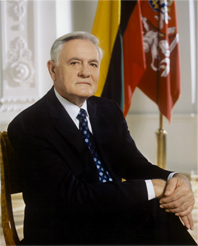
Former Lithuanian president, Valdas Adamkus, spoke at the MacMillan Center to a capacity crowd on April 15 on “The Role of Education in Post-Soviet Development,” but, as he began his talk, he urged his audience to rethink old labels and definitions, like “post-Soviet.”
“When you visit Vilnius – the capital of Lithuania – and find it easier to communicate in English than in Russian,” and “when the Baltic countries have all joined NATO and the European Union,” he said, “it’s high time to leave Soviet labels behind.”
He described the “peaceful, radical change” of the Baltic countries over the past two decades, which has brought democratic, liberal market economy regimes to Lithuania, Estonia, and Latvia, and a return to independent status that was “on the minds of the population during the half-century Soviet occupation.”
Adamkus said that when he considered the past 20 years, all the changes seemed like a natural progression. “We saw privatization, liberalization, stabilization and institutional change, which soon made the Baltic states the stars of the transformation reforms.” He said the country has withstood the recent economic meltdown and could offer some advice to Greece, whose economy has imploded this year.
Adamkus, who immigrated to the U.S. with his family in 1949, had a 29-year career with the U.S. Environmental Protection Agency, earning a top civil service award from President Ronald Reagan and retiring as a regional administrator in 1997. He was elected president in 1998 and served until 2003, and was elected again in 2004, retiring in 2009.
In discussing the educational reforms, he said, “It might be difficult to imagine the schools where there has been only one truth and one line of thinking, one interpretation of history, only one kind of economic, political and social thought, and those who had doubts about all this were not tolerated.” He said the changes have not been easy, but have been positively transforming the society as a whole, both because many of the brightest students have gone to study abroad before returning home to contribute to their country, and because many highly qualified foreign students and faculty members have come to Lithuania. “The exchange of professors and students is one of the extremely necessary steps,” Adamkus said, “if we want to compete, innovate, be dynamic and be part of the European Union economies.”
